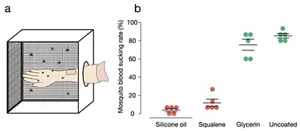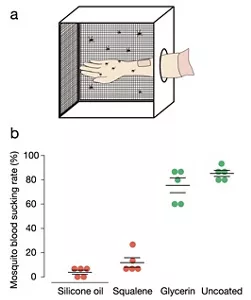Repellent Research Focusing on Mosquito Blood-sucking Behavior
Creation of a Skin Surface that Mosquitoes Dislike
A repellent technology that is different from conventional products, which creates a skin surface that mosquitoes repel and prevents humans from being bitten by mosquitoes is introduced.
Mosquito accretion test on human skin
We are also investigating whether mosquitoes will remain on the surface coated with hydrophobic liquid even when on human skin. Silicone oil (0.25 mg/cm2) was applied to the exposed part, and an arm was inserted into the box where 50 female mosquitoes were released, and a mosquito accretion test was conducted. As a result, less than 4% of the mosquitoes whose legs touched the exposed part remained for 1s (85% would have if no silicone applied).
It is a new discovery that silicone oil, which is widely used for cosmetics, makes it difficult for mosquitoes to land, and it is believed that it will lead to a repellent technique different from the mechanism of other repellents that repels by the smells that mosquitoes dislike, such as DEET.
Figure: Mosquito accretion test using human arm



(reference: modified from Iikura et al., Sci Rep 10, 14480 [2020])
Video: Phenomenon wherein mosquitoes do not stay on the skin because of the silicone oil coating.
- Home
- Innovation
- Research & Development
- Infectious Disease Control Study Dengue Virus Mosquito Research
- Repellent Research Focusing on Mosquito Blood-sucking Behavior
- Creation of a Skin Surface that Mosquitoes Dislike
- Home
- Innovation
- Research & Development
- Infectious Disease Control Study Dengue Virus Mosquito Research
- Repellent Research Focusing on Mosquito Blood-sucking Behavior
- Creation of a Skin Surface that Mosquitoes Dislike
